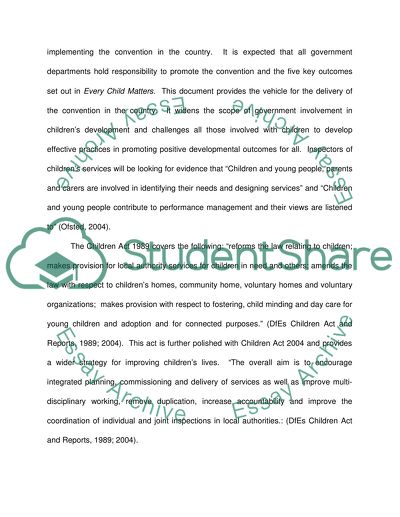Cite this document
(“The Governments vision, set out most recently in the Childrens Plan, Essay”, n.d.)
The Governments vision, set out most recently in the Childrens Plan, Essay. Retrieved from https://studentshare.org/miscellaneous/1562577-the-governments-vision-set-out-most-recently-in-the-childrens-plan-is-that-every-child-should-have-the-opportunity-to-fulfill-their-potential-critically-explore-how-sure-start-initiativespolicies-enable-children-to-reach-their-full-potential
The Governments vision, set out most recently in the Childrens Plan, Essay. Retrieved from https://studentshare.org/miscellaneous/1562577-the-governments-vision-set-out-most-recently-in-the-childrens-plan-is-that-every-child-should-have-the-opportunity-to-fulfill-their-potential-critically-explore-how-sure-start-initiativespolicies-enable-children-to-reach-their-full-potential
(The Governments Vision, Set Out Most Recently in the Childrens Plan, Essay)
The Governments Vision, Set Out Most Recently in the Childrens Plan, Essay. https://studentshare.org/miscellaneous/1562577-the-governments-vision-set-out-most-recently-in-the-childrens-plan-is-that-every-child-should-have-the-opportunity-to-fulfill-their-potential-critically-explore-how-sure-start-initiativespolicies-enable-children-to-reach-their-full-potential.
The Governments Vision, Set Out Most Recently in the Childrens Plan, Essay. https://studentshare.org/miscellaneous/1562577-the-governments-vision-set-out-most-recently-in-the-childrens-plan-is-that-every-child-should-have-the-opportunity-to-fulfill-their-potential-critically-explore-how-sure-start-initiativespolicies-enable-children-to-reach-their-full-potential.
“The Governments Vision, Set Out Most Recently in the Childrens Plan, Essay”, n.d. https://studentshare.org/miscellaneous/1562577-the-governments-vision-set-out-most-recently-in-the-childrens-plan-is-that-every-child-should-have-the-opportunity-to-fulfill-their-potential-critically-explore-how-sure-start-initiativespolicies-enable-children-to-reach-their-full-potential.


